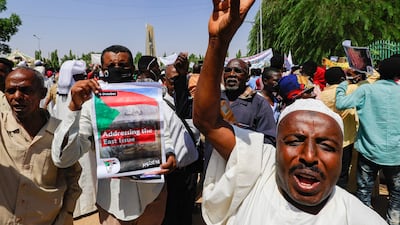There was abounding hope at home and abroad when in 2018 Sudanese people rose up against their dictator, Omar Al Bashir, whose repressive rule had previously shoved the country into isolation. After this great moment in the country's history, there was optimism that a new order could enact reforms to make Sudan no longer a country centred on the agenda of a corrupt leader, but instead one with a government and wider state that serves the country in its entirety.
Two and a half years later, as economic hardship and political tensions compound, Sudan’s Prime Minister Abdalla Hamdok has been compelled to unveil on Friday a road map to reduce mounting tensions between the civilian-led government, which he heads, and the military. Both are crucially important for creating a new and secure Sudan and both appear committed to doing so. But, as is so often the case with uprisings, adjusting to the aftermath is far from easy and in the heat of the moment approaches can differ.
Mr Hamdok was clear about the importance of boosting collaboration and trust between all those with a stake in the country’s future, saying that that “our message to all parties of the transitional period is that nations are never built by personal frictions or casual reflexes”.
He is right to stress the importance of this. Large pro-military crowds gathered on Saturday to protest against the direction in which Mr Hamdok's government is attempting to take the country. Mere weeks ago, a small, pro-Bashir element within the Sudanese military attempted a coup. The threat posed by such power grabs to Mr Hamdok's efforts are very real: over the past seven decades, there have been almost two dozen coup attempts by the army, three of which were successful.
This is no reason to give up. The same period also saw three pro-democracy movements that toppled military rule, and Mr Hamdok is right to stress that dialogue alone will break this cycle. Now that Bashir is gone, there is, if both sides can tolerate it, a chance for rational debate between civilians and soldiers.
But it is not just the military that requires introspection if such a dialogue is to mean something. The civilian-led government, while good in principle, has had a bumpy policy record. The economy is in a precarious state. Rising inflation diminishes spending power, putting a strain on businesses already weakened by Covid-19. Parts of the population are struggling to make ends meet.
The only long-term solution to this economic decline is a stable environment that inspires confidence at home and attracts investment from abroad. To achieve this, Mr Hamdok’s administration must demonstrate competence quickly, and its military guarantors must secure the civilian government’s efforts – not empower those who wish to threaten them.
When, in 2019, Mr Hamdok was appointed prime minister with the support of the protest movement and consent of the army, he boasted of a new way forward that he called “the Sudan model – a model of partnership between civilians and the military, paradoxically, to bring democracy”. If his supporters and their pro-military critics can continue to keep cool heads and summon the strength for constructive dialogue, that project can still be saved, and Khartoum will be able to celebrate a uniquely Sudanese victory.





















